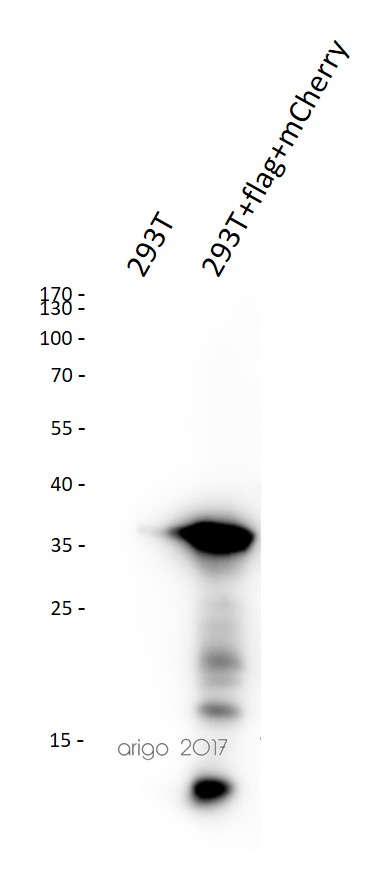ARG62342
anti-DDDDK tag antibody [FG4R]
anti-DDDDK tag antibody [FG4R] for Dot blot,ELISA,ICC/IF,Immunoprecipitation,In situ hybridization,Western blot and Other
Controls and Markers antibody; Tag Internal Control antibody

1
Overview
| Product Description | Mouse Monoclonal antibody [FG4R] recognizes DDDDK tag (Equivalent to Sigma's anti-FLAG antibodies). |
|---|---|
| Tested Reactivity | Other |
| Tested Application | Dot, ELISA, ICC/IF, IP, ISH, WB |
| Specificity | Recognizes the N-terminal, C-terminal or internal DYKDDDDK-tagged fusion proteins. |
| Host | Mouse |
| Clonality | Monoclonal |
| Clone | FG4R |
| Isotype | IgG1 |
| Target Name | DDDDK tag |
| Antigen Species | Others |
| Immunogen | DYKDDDDK (FLAG) synthetic peptide conjugated to KLH. |
| Conjugation | Un-conjugated |
Application Instructions
| Application Suggestion |
|
||||||||||||||
|---|---|---|---|---|---|---|---|---|---|---|---|---|---|---|---|
| Application Note | The dilutions indicate recommended starting dilutions and the optimal dilutions or concentrations should be determined by the scientist. |
Properties
| Form | Liquid |
|---|---|
| Purification | Protein A Purified |
| Purification Note | Protein A affinity chromatography from mouse ascites fluid. |
| Buffer | 10mM PBS (pH 7.2) and 0.05% Sodium azide. |
| Preservative | 0.05% Sodium azide |
| Concentration | 1 mg/ml |
| Storage Instruction | For continuous use, store undiluted antibody at 2-8°C for up to a week. For long-term storage, aliquot and store at -20°C or below. Storage in frost free freezers is not recommended. Avoid repeated freeze/thaw cycles. Suggest spin the vial prior to opening. The antibody solution should be gently mixed before use. |
| Note | For laboratory research only, not for drug, diagnostic or other use. |
Bioinformation
| Gene Full Name | DDDDK Epitope Tag |
|---|---|
| Background | Epitope tags provide a method to localize gene products in a variety of cell types, study the topology of proteins and protein complexes, identify associated proteins, and characterize newly identified, low abundance or poorly immunogenic proteins when protein specific antibodies are not available. Tagging with xxxDDDDK may be done at the N-terminus, N-terminus preceded by a methionine residue, C-terminus, and in internal positions of the target protein. The small size of the epitope tag and its high hydrophilicity tend to decrease the possibility of interference with protein expression, proteolytic maturation, antigenicity and function. The enterokinase cleavage site allows it to be completely removed from the purified fusion proteins. Cleavage catalyzed by Cu2+ ions of the C-terminal xxxDDDDK from a fusion protein has been reported (Humphreys, D.P., et al., 1999). A sequence motif with five out of eight amino acid residues identical to the xxxDDDDK is found in both rat and mouse Mg2+ dependent protein b-phosphatase, as well as in the human and bovine enzyme. |
| Highlight | Related products: DDDDK antibodies; DDDDK Duos / Panels; Anti-Mouse IgG secondary antibodies; |
| Research Area | Controls and Markers antibody; Tag Internal Control antibody |
Images (1) Click the Picture to Zoom In
Customer's Feedback
Specific References










